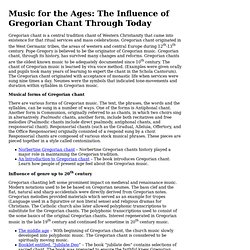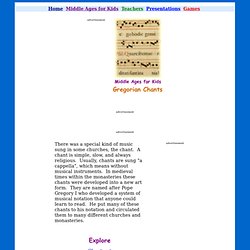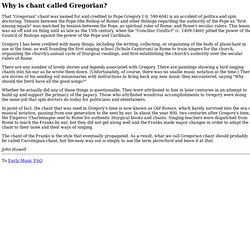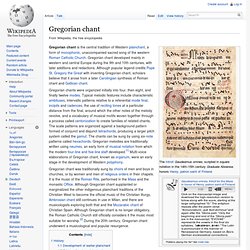

The Influence of Gregorian Chant Through Today. Gregorian chant is a central tradition chant of Western Christianity that came into existence for that ritual services and mass celebrations.

Gregorian chant originated in the West Germanic tribes, the areas of western and central Europe during 12th-13th century. Pope Gregory is believed to be the originator of Gregorian music. Gregorian chant, through its history, has survived many changes and reforms. Gregorian chants are the oldest known music to be adequately documented since 10th century. The chant of Gregorian music is learned by viva voce method. Musical forms of Gregorian chant There are various forms of Gregorian music. Norbertine Gregorian chant – Norbertine Gregorian chants history played a major role in maintaining the Gregorian tradition. Influence of genre up to 20th century Gregorian chanting left some prominent impact on medieval and renaissance music. The middle age – With beginning of Gregorian chant, the church music slowly developed into polyphonic music. Gregorian chant - Deus, Deus meus. The Middle Ages for Kids - Gregorian Chants. There was a special kind of music sung in some churches, the chant.

A chant is simple, slow, and always religious. Usually, chants are sung "a cappella", which means without musical instruments. In medieval times within the monasteries these chants were developed into a new art form. They are named after Pope Gregory I who developed a system of musical notation that anyone could learn to read. He put many of these chants to his notation and circulated them to many different churches and monasteries. Explore Chant ppt A guide to Medieval instruments 6-minute medieval music marathon Free Presentations in PowerPoint format Free Online Games for the Middle Ages Free Middle Ages Clipart for Kids & Teachers Free Clip Art Middle Ages for Teachers Return to The Middle Ages for Kids.
Why is chant called Gregorian? That "Gregorian" chant was named for and credited to Pope Gregory I (r. 590-604) is an accident of politics and spin doctoring.

Tension between the Pope (the Bishop of Rome) and other Bishops regarding the authority of the Pope as "first among equals" was matched by tension between the Pope, as spiritual ruler of Rome, and Rome's secular rulers. This tension was an off and on thing until as late as the 15th century, when the "Conciliar Conflict" (c. 1409-1460) pitted the power of the Council of Bishops against the power of the Pope and Cardinals. Gregory I has been credited with many things, including the writing, collecting, or organizing of the body of plainchant in use at the time, as well founding the first singing school (Schola Cantorum) in Rome to train singers for the church, organizing the church's annual cycle of liturgical readings, and first establishing the church's authority over the secular rulers of Rome.
Whether he actually did any of these things is questionable. Gregorian chant. Gregorian chant is the central tradition of Western plainchant, a form of monophonic, unaccompanied sacred song of the western Roman Catholic Church.

Gregorian chant developed mainly in western and central Europe during the 9th and 10th centuries, with later additions and redactions. Although popular legend credits Pope St. Gregory the Great with inventing Gregorian chant, scholars believe that it arose from a later Carolingian synthesis of Roman chant and Gallican chant. History[edit] Development of earlier plainchant[edit] Musical elements that would later be used in the Roman Rite began to appear in the 3rd century. Scholars are still debating how plainchant developed during the 5th through the 9th centuries, as information from this period is scarce. John the Deacon, biographer (c. 872) of Pope Gregory I, modestly claimed that the saint "compiled a patchwork antiphonary",[11] unsurprisingly, given his considerable work with liturgical development.
Origins of mature plainchant[edit] Gregorian chant - Deum verum.